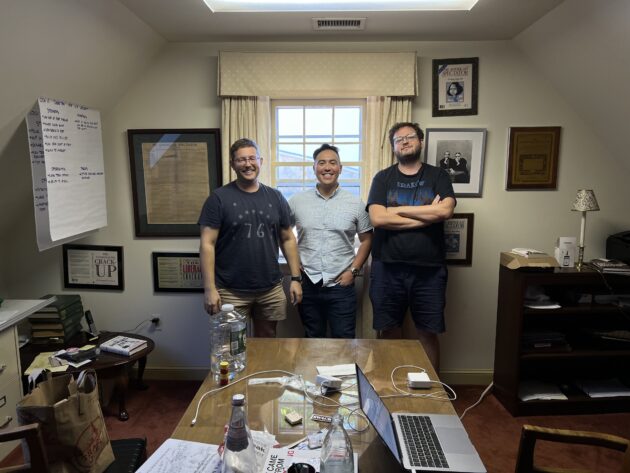
Josh Steinman spent four years working as a senior director inside the National Security Council at the White House. One of his biggest takeaways from that experience was the vulnerability of industrial operations that were becoming more digitized — and more susceptible to cyberattacks.
Steinman is now the CEO of Galvanick, a startup that describes itself as an industrial cybersecurity company. Manufacturers in the aerospace and telecom sector are using Galvanick to help monitor their work environments for any potential breaches.
Steinman, a former U.S. Navy officer, founded the company in 2021 with Brandon Park, a former security engineer for industrial control systems at Amazon, and Feliks Pleszczynski, who also worked in the White House and was deputy chief economist for the U.S. Department of Labor.
Galvanick recently opened an office in Seattle, just nearby Amazon’s headquarters. Park is based in Seattle; Steinman and Pleszczynski live in Los Angeles, where the 10-person company has an additional office.
Ransomware attacks against industrial companies were up around 50% last year, according to The Wall Street Journal, citing a report from Dragos.
“We started this company because we knew the threat was going to continue to grow,” Steinman said.
Dragos found an increase in groups targeting “operational technology,” versus information technology (such as accounting or HR software).
Meanwhile, there are geopolitical forces at play. FBI officials have warned of potential Chinese hacking operations that could affect U.S. infrastructure.
“The barriers are getting lower, and the attraction is getting higher,” Steinman noted.
Galvanick’s software analyzes data being used within an industrial operation, and provide alerts to any abnormal activity.
“You can think of us as digital overwatch for big, connected facilities,” Steinman said.
Steinman said there’s a dearth of qualified cybersecurity professionals that specialize in industrial scenarios — which is providing tailwinds for Galvanick.
“We help a very small team cover a very broad area, and protect a lot of infrastructure,” he said.
Even as demand for cybersecurity tools rises, venture capital investment to related startups fell last year, according to TechCrunch.
Galvanick still manage to raise a $10 million seed round in June. Its backers include MaC Venture Capital; Founders Fund; Village Global; Countdown Capital; Hanover Technology Investment Management; Shrug Capital; and 8090 Industries.
Steinman said there’s a lot of promise from AI to help combat threats — for example, being able to instantly identify patterns and alert for risk.
But there is little-to-no room for error for many industrial companies, he said, so it may take time before AI tools are fully embraced.
“There’s a really high bar for what is allowed to exist on these types of systems,” he said. “It’s going to be a while until AI gets deployed, just because the scrutiny is incredibly high.”

